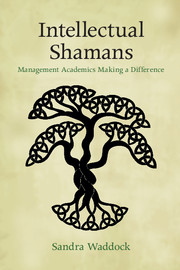3 - Beyond the self: power of purpose
Published online by Cambridge University Press: 18 December 2014
Summary
In the last chapter, I explored how becoming an intellectual (or any other type of) shaman means having the courage to become who you really are. Intellectual – or any other form of – shamanism involves allowing a sense of inherent power to emerge out of deeper purpose, taking the individual beyond self, beyond pure self-interest, to attempting to do something for the world. Finding and realizing that calling or deeper purpose to become fully who you can be is what the psychologist Abraham Maslow calls ‘self-actualization.’
To accomplish the task of fully becoming yourself, it is important to come to understand what your unique purpose in the world might be. Coming to purpose also requires having the courage to follow that purpose and the willingness to go at least somewhat off the beaten track if necessary. Heeding the ‘call’ to purpose can come in any number of ways. Some paths are subtle, others more obvious; some are clear straight away and others take a roundabout and lengthy path. We saw in the last chapter, for example, how David Cooperrider and Otto Scharmer experienced sudden transitions and awareness, built on a range of prior life experiences, while others, such as Nancy Adler, Jane Dutton, and Dave Brown, perhaps more typically, took circuitous routes. Heeding the call to purpose also means acknowledging the power that is associated with purpose – sometimes simply the power to do the work to which one is called.
- Type
- Chapter
- Information
- Intellectual ShamansManagement Academics Making a Difference, pp. 82 - 136Publisher: Cambridge University PressPrint publication year: 2014



